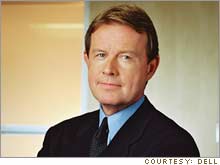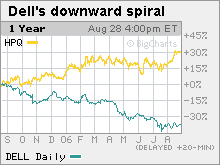|
Putting the fire out at Dell Shares have slumped nearly 40 percent in the past year. What will it take to get the PC maker back on track? NEW YORK (CNNMoney.com) -- A steady stream of bad news has Dell in the hot seat. Is there anything the world's largest maker of personal computers can do to put out the fire? In a span of two weeks, the company reported weak second-quarter earnings, issued a recall of more than 4 million laptop batteries and saw its stock downgraded by multiple Wall Street analysts.
According to Thomson First Call, eight analysts rate Dell's stock a "buy" or "strong buy," while 15 give it a "hold" rating - a sign that Wall Street may be running out of patience with Dell (Charts). Long lauded by Wall Street for its direct-to-consumer model, which helps Dell keep a tight rein on costs, the company has stumbled lately owing to tougher competition from a nimbler Hewlett-Packard (Charts). Slowing growth in its core PC and server markets has also concerned investors. Dell's shares have plunged nearly 40 percent in the past year. And after five straight quarters of relatively weak financial results, Dell chief executive officer Kevin Rollins has found himself in the crosshairs of Wall Street analysts. Rollins took over as CEO in 2004 from company founder and chairman Michael Dell, who has expressed support of Rollins in the wake of the battery recall. Executives from Dell could not be reached for comment for this story. Roger Kay, president of technology consulting firm Endpoint Technology Associates, thinks Dell needs to make some changes to get back on track, but overall its business remains solid. "The direct model is fundamentally sound. Dell still has the most efficient supply and distribution chain," Kay said. Attitude change That doesn't mean the model is perfect. In developing countries, it's hard to do business at an arm's length - which puts the company's direct-to-consumer model at a disadvantage. Dell has made gains in China and India, but many of those sales have been to government and business customers. In these critical high-growth markets where consumer trust is low, Dell needs to show more flexibility, Kay said. That means Dell needs to find a way to get its products out in front of its consumers. "Consumer products need to be seen to be bought. That's where Dell's dilemma is," he observed. A retail push, that is, selling PCs through stores or setting up its own stores like Apple (Charts) has, may or may not be the solution to the problem, Kay said. But acceptance is the first step in getting changes under way, and it could also help reinvigorate growth - something the company has been struggling with as its U.S. and European markets mature. Eye on efficiency Dell still holds the top position in worldwide PC shipments with 17.7 percent of the market, according to research firm Gartner. But strong consumer growth has helped HP, which has a 14.8 percent share of the market, gain ground. Dell has already taken steps to nurse its consumer relationships - it is spending $100 to $150 million to overhaul its troubled customer service operations - but the added expense could put pressure on its margins. "They're planning on increasing spending as they bring back some of the service areas they've outsourced - and that adds to costs," said Wendy Abramowitz, an analyst at Argus Research. So it will be important for Dell to find other areas where it can cut costs to improve operational efficiency, she emphasized. New playbook Slashing prices, a strategy Dell usually employs when faced with slowing growth and threats to market share, may further hurt profits. Aggressive pricing has helped drive growth for Dell in the past, but the strategy isn't working right now, Goldman Sachs analysts wrote in a recent research note in which they downgraded the company's stock to "sell." "With Dell's main weapon - pricing - having little effect, Dell will need to reposition itself to be more competitive in the faster growing parts of the market," the analysts wrote. It will take time for Dell to work through its problems, and no major announcements are expected to come out at the company's upcoming analysts' meeting set for Sept. 12-13, the report also said. More dog days ahead may have Wall Street antsy, but Kim Caughey, an analyst at Fort Pitt Capital Group, which owns shares of Dell and has held its position steady in the wake of recent events, expects the company to bounce back. Businesses are holding off on buying PCs and servers because they're waiting for Vista, Caughey said, referring to Microsoft's (Charts) newest version of its Windows operating system. She expects corporate spending on PCs to rebound once Vista is released later this year. "Investors just need to ride out the storm," she said. None of the analysts quoted in this story own shares of Dell. Goldman Sachs has an investment banking relationship with the company. |
Sponsors
|


